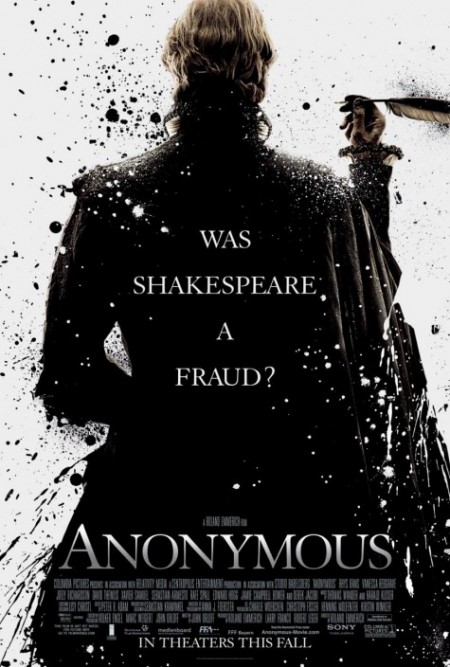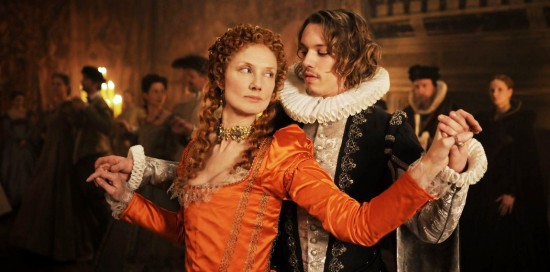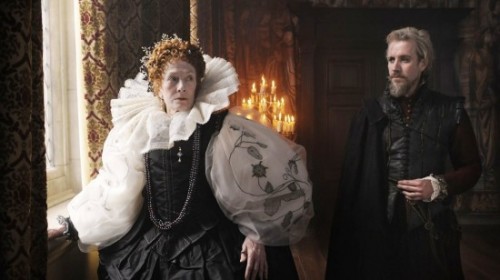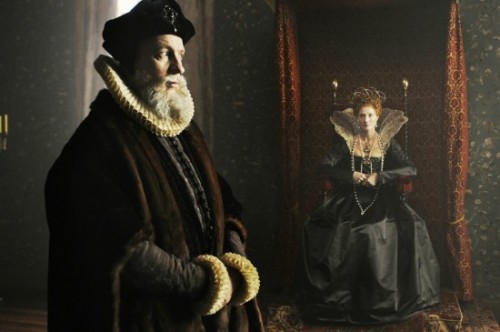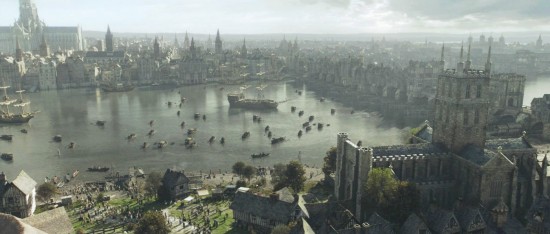Anonymous [DVD] [2011] Rating: 




Set amidst the treacherous, shifting sands of Elizabethan England, Anonymous brings to life an issue that for 400 years has intrigued academics, actors and theatre lovers… Who was the author of the plays credited to William Shakespeare? Anonymous poses one possible answer, focusing on a time when political intrigue, illicit romances in the Royal Court, and the schemes of powerful nobles were fearlessly exposed in the powder-keg that was the London stage.
The plot of the film, as entertaining as it is intriguing, is an attempt to show how Edward de Vere, seventeenth earl of Oxford (Rhys Ifans), known to be a writer of poems and plays, secretly had his best works performed under another man’s name. In reality, all the corroborating evidence about anonymity and pseudonymity in Elizabethan authorship is generally ignored by Shakespeare specialists.
Why did de Vere have to conceal his authorship? For many reasons. Members of the nobility did not write for the common theatre. They did not publish poems under their own name during their lifetime. The evidence suggests that keeping one’s authorship secret helped promote what Keats called Shakespeare’s “negative capability”—keeping his own identity in the background- as he created hundreds of utterly convincing characters. The plays of Shakespeare feature many characters that mirror powerful court figures, and comment on actual court intrigues. By ridiculing the ruling classes and crafting stories allegorical to the politics of the age, Oxford as Shakespeare uses the strength of the word to influence the actions of the masses and guide popular opinion. How much truth is there in this?
The Elizabethan theatre audience (as depicted in the film) recognized the character Richard III as a spoof of de Vere’s hunch-backed brother-in-law, Robert Cecil (Edward Hogg). They also recognized Polonius in Hamlet as a disguised portrayal of de Vere’s father-in-law, Burghley (David Thewlis). Some Shakespeare scholars will still admit the latter is correct, though others have backed off from this identification, since it strengthens the case for de Vere’s authorship.
However, it cannot be denied that several nineteenth century Shakespeare scholars agreed Polonius was a spoof on Lord Burghley. We all know that Shakespeare’s Richard III did not get his hump from the historical Richard III. Is the contention really shocking that Elizabethan theatre was so popular partly because it contained disguised but subversive political commentary?
THE SHAKESPEARE AUTHORSHIP QUESTION
Both Emmerich and Orloff admit their film takes poetic license in order to provoke and entertain. But the Stratfordians, that is, scholars who will only consider Shakespeare as the author, are not amused. Their over-reaction to the film is inquisitional in its tone. Someone placed a white sheet over the head of Stratford’s Shakespeare monument on opening night! The Shakespeare establishment may just have made things worse for itself by forgetting this is just a film, “methinks they doth protest too much”..
Jonathan Bate , Stratfordian scholar, agreed the film is visually beautiful, but suggests it might help the cause of Shakespeare (as author). “I think, when it gets to suggesting that Oxford was both the lover and son of Elizabeth, it seems to be pushing things a little far. But it could perform a service to the truth, because it is so obviously a complete farrago of invention, a Da Vinci Code-style conspiracy that I don’t think anybody will take it seriously.”
Certain premises are repeated by Stratfordians as incontrovertible refutations that de Vere could not be the author. Many plays of Shakespeare are thought to have been written after 1604, the year that de Vere died. But, as some Shakespeare scholars admit, we simply do not know with certainty when any of the plays were written. The conventional dating of the plays is primarily based on Shakespeare of Stratford having died in 1616. So it was assumed he wrote roughly two plays per year, and these assumptions played a crucial if circular role in the conjectural dating of when the plays were written.
THE CHARACTER OF ELIZABETH I
Queen Elizabeth (Vanessa Redgrave) is possibly the most empathetic on-screen version of this most famous historic character. We see the elaborate dresses and pristine wig, but we also get a glimpse of the frail, emotional woman beneath the make-up.
However, in this film Queen Elizabeth successfully covered up the birth of illegitimate children by different fathers, at least one of them born long before she was ruler of the country and that she could have anyone who leaked her secrets locked away in the tower or beheaded. This is pretty incredible granted, but the authoritative Neville Williams (The Life and Times of Elizabeth I) confirms (p114) that there were contemporary rumours that the Queen and Oxford were lovers, and Southampton was their offspring.
Even so, at about the time Princess Elizabeth (Joely Richardson) in the film is supposed to have had the first of these secret children, (which Robert Cecil in the film attempts to explain she could cover up as she was not so important back then so nobody was paying her much attention,) in real history one of the most powerful noblemen in the country, Thomas Seymour, went to the block for treason. This was partly because he had behaved improperly to the teenage Princess Elizabeth and was suspected of trying to marry her to claim the throne. Far from nobody paying attention to who the teenage princess kissed, it was one of the biggest scandals of the sixteenth century, was she ever free of her inquisitive ladies-in-waiting thereafter?
A couple of years later Elizabeth’s sister Mary, who by this time had become Queen, and certain courtiers who were desperate for evidence of treason by Elizabeth which might have enabled them to eliminate her as a rival, searched with a fine toothcomb for the slightest hint of incriminating evidence against her. It is very unlikely indeed that if Elizabeth had at that point given birth to an illegitimate child they would not have discovered it and used the fact at best to discredit her and at worst have her executed.
It appears to have been Robert Cecil who is known to have persuaded Queen Elizabeth to spare the life of the Earl of Southampton (Xavier Samuel), after he had been sentenced to death for his part in Essex’s abortive rebellion. He was promised Southampton’s wealth and estates by the family. It is highly probable, or at the least conceivable, that de Vere did make a more personal appeal.
Then there is Shakespeare (Rafe Spall) himself. His character is so obnoxious, can we accept that the great Shakespeare was really a crowd-surfing, vain-glorious mob rouser? But of course, this makes a point.
DOES THE FILM DO JUSTICE TO THE AUTHORSHIP QUESTION?
Derek Jacobi promises in the prologue to tell a ‘darker story’ and dark the story certainly is; full of tightly framed under-lit shots of men in tights, ruffs and beards shouting at each other and generally being underhand. Robert Cecil (Edward Hogg) is a grumpy hunchback who, like his father, hates the arts and schemes against Elizabeth’s wishes to put King James of Scotland on the throne. There is a great moment when Elizabeth absently calls him ‘William’. His taciturn reply: “Robert, ma’am. Father William is greatly missed”. William Shakespeare is a drunken fornicator who kills Christopher Marlowe when he discovers the truth about his non-authorship of the plays. Ben Jonson (Sebastian Armesto) is a sad, envious and vindictive reflection of the real character.
‘Oxfordians have waited a long time for this film, it promised to be a sincere attempt to present coherent theories about the nature of the writer we know as Shakespeare. The critics, meanwhile, accuse them of being like Holocaust deniers; being anti-semitic; being like the birthers who deny that Obama is a U.S. citizen; being like people who claim NASA never landed on the moon, or who claim the U.S. organized the 9/11 attacks. Do you not detect a whiff of desperation in such accusations?’ (Richard Waugaman)
If we want a strictly accurate film about de Vere, Emmerich has failed. But if the goal is to introduce the general public to the Shakespeare authorship theory and invite a closer look, then Emmerich has succeeded admirably. After all, the precedent is Shakespeare’s own history plays; they too play fast and loose with the historical facts, but not without purpose.
Many of the reviews of Anonymous have slated the film because its premise is so controversial. A common theme in these critical reviews is the assumption that the Shakespeare scholars must be correct, and there is “no evidence whatsoever” that Shakespeare did not write Shakespeare.
What about the possibility that de Vere left some unfinished manuscripts at his death, and playwrights such as Fletcher finished them? Since the late plays do show evidence of collaboration, this narrative is more plausible than the orthodox speculation that Shakespeare “apprenticed himself” to other playwrights when he began writing the late plays.
It is at least plausible that William Shakespeare of Stratford was born fourteen years too late to have been the author, since many plays of ‘Shakespeare’ are conventionally described as rewritten earlier plays. Again, in an example of circular reasoning, scholars assume these anonymous earlier plays had to be written by playwrights other than Shakespeare. They accuse Oxfordians of being too wedded to their theory, but we should all be cautious to avoid cherry-picking evidence that confirms our preconceptions.
Finally, how empty and dishonest is the accusation that Oxfordians haven’t produced “a shred of evidence” that de Vere wrote the canon. The list of books and articles continues to grow; and Roger Stritmatter’s dissertation on the value of de Vere’s Geneva Bible is evidence in abundance.
See posts: The Shakespeare Authorship Question and Alias Shakespeare by Joseph Sobran
Thanks to: 1. The Oxfreudian , Richard M Waugaman, M D
2. Shakespeare by Another Name: The Life of Edward de Vere, Earl of Oxford, the Man Who Was Shakespeare by Mark Anderson
